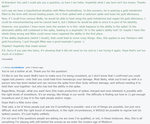HazelCharm47
Let's say we have a hypothetical situation with Miles Hundredlives. In this scenario, he is wearing a gold metalmind filled to the brim with stored healing power. He is then spiked with a cadmium spike and loses his gold allomancy.
Now, if I recall from various WoBs, he would be able to heal using the gold metalmind and regain his gold allomancy. I could be misremembering and he cannot heal it, but I believe he would be able to since it is part of his Identity.
However, one question I have never seen the answer to is this: what happens to the ability in the spike? Is the allomantic ability still contained in the spike, leading to a duplicate? Or is the spike's ability lost? Or maybe I have this whole thing wrong and Miles could never have regained the ability in the first place.
If the ability duplicates (which I doubt), that could lead to some crazy things. Also, this applies to any Twinborn with gold Feruchemy, I just thought Miles was a good example I guess :)
Brandon Sanderson
I'd like to see the exact WoB's here to make sure I'm being consistent, as I don't know that I confirmed you could regain lost powers--only that you could heal from hemalurgic soul damage. Most likely, what you'd end up with is a person who has been healed and can remove the spike from their body without damage, and without needing it to hold their soul together--but who has lost the ability in the spike.
Regardless, though, what you want here (the mass production of spikes charged and even blanked) is possible with the right levels of investiture. It's an energy, like things in our world. The difficulty is finding out how to 1) get enough investiture and 2) key it to the right people and/or magic.
Hope that's a little more clear.
That said, a lot of times people just ask me if something is possible--and a lot of things are possible, but just very difficult. And with the right boost of investiture, in the right circumstances, it WOULD be possible to regrow lost (to spikes) powers. It's just highly unlikely.
I'm not sure if the questions people are asking me are ones I've qualified, or not, in these instances. Also, this is all something I'm playing with still behind the scenes as we enter the modern age of Mistborn.
HazelCharm47
As requested, here are the WoBs I believe are related. They might be obsolete, however. And I assume things will get changed a lot before Era 4, but hey, it's fun to ask anyways :)
WoB #1:
https://wob.coppermind.net/events/331/#e9434
This one states that as long as Miles still has his Identity, he would be able to use his Feruchemical metalminds after being spiked and would be able to heal.
WoB #2:
https://wob.coppermind.net/events/102/#e983
This one says that Miles would be able to heal his soul using Feruchemical healing and regain his gold Allomancy (assuming he survives the spiking). I think this is the most essential one!
WoB #3:
https://wob.coppermind.net/events/76/#e6335
This one is only somewhat related - implies that the Feruchemical and Allomantic powers are spiritually part of him.
WoB #4:
https://wob.coppermind.net/events/7/#e6435
Also tangentially related - damage to the soul from Hemalurgy can be healed (Although this might just be a Hoid thing). I guess the question could be expanded to include non-Feruchemical healing as a way to repair the soul after being spiked.
Brandon Sanderson
Well, I don't think any of those are specifically inaccurate. I just didn't quite understand what people were trying to get out of me. A lot of times, I don't know quite what people are trying to get out of me. I can see now they're trying to figure out.
I see now, and I appreciate you putting this all together for me so I can see what the fans are trying to figure out. So the answer is a cautious yes. The problem here is that he'd need to compound a TON of healing first--but yes, it would work. You could theoretically turn someone like Miles into an invested spike factory.
If he didn't have enough healing stored, though, he'd end up with a healed soul but a gap (like a scar on his soul) where his spiked-out abilities were. That could theoretically be healed with application of more investiture, depending on things like how he views himself, and if you could get the right type of investiture.


